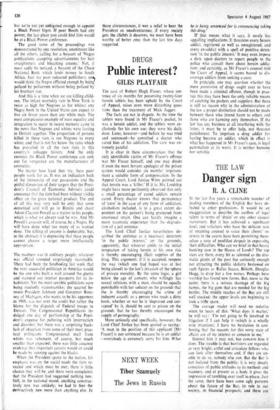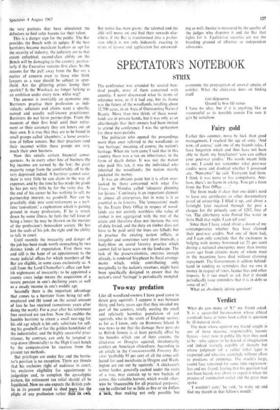Danger sign
THE LAW R. A. CLINE
In the last five years a remarkable number of leading members of the English Bar have de- fected to other professions. It would be an exaggeration to describe the outflow of -legal talent in terms of 'drain' or any other cloacal movement. But it has achieved a significant level, and solicitors who have the delicate task of retaining counsel to voice their clients' in- terests in the courts have been permitting them- selves a note of modified despair in expressing their difficulties. Who can we brief in that heavy banking case in the House of Lords? The top stars are there, every bit as talented as the dra- matic giants of the past but curiously enough not attracting the public idolatry bestowed on such figures as Rufus Isaacs, Birkett, Douglas Hogg, to drop but a few names. Perhaps hero worship has found new forms. But, more to the point, there is a serious shortage of the big names, the big guns that are needed for the big battles. The middle reaches of the Bar are still well stocked; the upper levels are beginning to look a trifle spare.
The average reader will need no sedative when he hears of this. 'What does it matter,' he will say : 'I'm not going to ge involved in litigation if I can help it (which is a wholly wise intention). I have no hesitation in con- fessing that the reasons for this sorry state of affairs are of no interest or concern to me.'
Interest him it may not, but concern him it does. The trouble is that barristers are regarded as very bright, artful and articulate fellows who can look after themselves and, if they are un- able to do so, nobody else can. But the Bar is not isolated from the public; it is very deeply conscious of public attitudes to its methods and manners, and at present as a ,body it gives the impression of tumbling over itself to please. Just the same, there have been some ugly portents about the future of the Bar, its role in our society, its -financial prospects; and these are
the very portents that have stimulated the defectors to find safer havens for their talent.
This is a danger sign for the public. The Bar provides the Bench with its judges. If the best barristers. become merchant bankers or opt for the security of industry, the judiciary are to that extent enfeebled; second-class ability on the Bench will be damaging to the country. particu- larly if the Executive remains first class. So the reasons for the pull away from the Bar are a matter of concern even to those who think lawyers as a race should be subject to apar- theid. Are the glittering prizes losing their sparkle? Is the Woolsack no longer lurking as an ambition under every new, white wig?
The answer is inevitably an economic one. Barristers practise their profession as indi- viduals; solicitors and clients want a specific, named and usually well-known practitioner. Barristers do not form partnerships. From the moment of their first brief until their retire- ment or their coronary they are loners out on their own. It is true that they are to be found in small groups called 'chambers,' a loose associa- tion of fellow tenants. But their practices (and their income) within these groups are very much their own business.
Now this entails certain financial conse- quences. As in every other line of business the big incomes are earned by the few: the great majority range from the comfortably off to the very depressed indeed. A barrister cannot save: there is very little he can claim in the way of expenses, and by the time he has made the grade he has put very little by for the rainy day. At the end of his career he has nothing to sell, no partnership interest, no goodwill. Nor can he gracefully slide into semi-retirement as a part- time 'consultant,' a euphemism which is gaining ground in many professions. If he is struck down by some illness, he feels the full force of being a loner; he may be thrown on the mercies of the profession's benevolent society. He has lost the tools of his job, the right and the ability to talk in court.
Until recently the insecurity and danger of the job has been made worth stomaching by two distinct kinds of expectation. First there was and still is the hope of an appointment to the many judicial offices for which members of the Bar are eligible, in some cases exclusively so. A call from the Lord Chancellor's office can ban- ish nightmares of insecurity; to be appointed a county court judge means the acquisition of a secure pension in one's declining years as well as a steady income in one's middle age.
Secondly there is the important advantage that comes to a barrister from being (a) self- employed and (b) taxed on the actual amount of fees he has received (sometimes years after doing the work). For a year after his retirement fees received are tax-free. Now this enables the humble barrister to create a small nest-egg for his old age which is his only substitute for sell- ing his goodwill or for the golden handshake of, the industrialist; and the highly successful prac- titioner, by contrast, can only be tempted to step down (financially) to the High Court bench by the compensation he receiyes from the present tax methods.
'But privileges are under fire and the barris- ter's position is no exception. There are threats that his exclusive right of audience in court, his exclusive eligibility for appointment to judgeships and, to complete the apocalyptic picture, his retirement tax relief should all be liquidated. Now no one expects the British pub- lic in its present mood to shed tears for the plight of any profession rather tlaritti ca r& But notice has been given: the talented and the able will move on and find their rewards else- where, if the Bar is transformed into a profes- sion which is not only hideously exacting in terms of leisure and application but unreward- ing as well. Justice is measured by the quality of the judges who dispense it and the Bar that tights fOr it. Egalitarian societies are not the breeding ground of effective or independent advocates.































 Previous page
Previous page